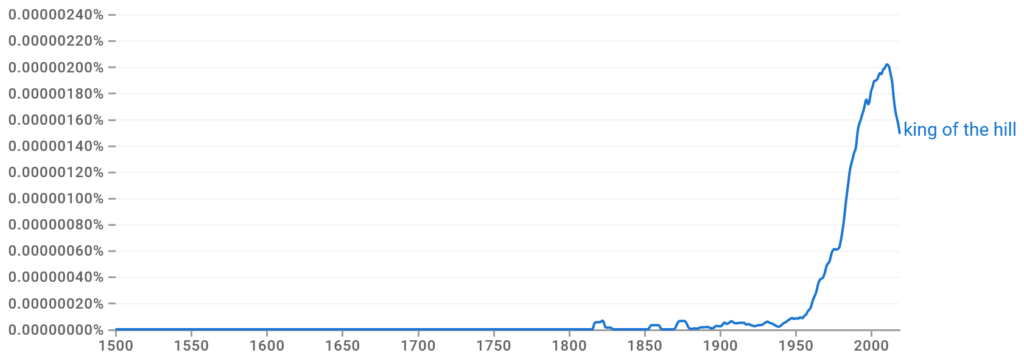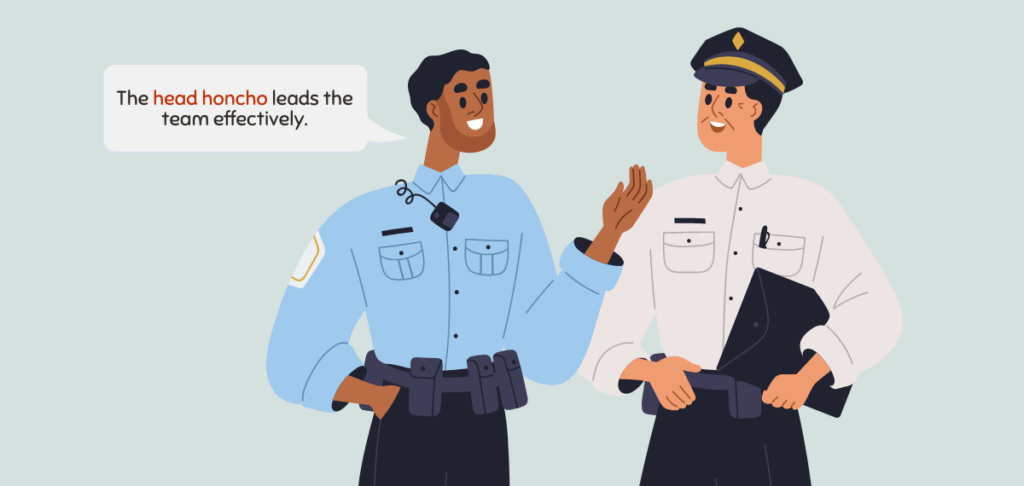King of the hill means being in a dominant position or at the top in a competitive scenario. It highlights the aspect of triumph and leadership, similar to achieving the highest rank in a contest or field.
Idiomatic expressions like king of the hill are frequently used phrases with meanings beyond their literal interpretation. While each word in the phrase has a concrete meaning, they take on a metaphorical sense when used together as an idiom.
Understanding idioms is essential for effectively navigating the English language because they usually encapsulate our complex ideas perfectly. If you use them in the wrong context, they lose all meaning.
In this article, I cover all the details about the literal and figurative meanings, origin, variations, and practical applications of the idiom king of the hill, complete with helpful examples and a quiz at the end.

What Does the Idiom King of the Hill Mean?
The idiom king of the hill means being in a position of power or dominance, like being the leader or the best at something.
The Collins Dictionary defines the idiom king of the hill as “an undisputed leader or champion.” That’s a fairly succinct definition of the phrase. However, when you dig deeper, you’ll find that it’s more about signifying a position of superiority or dominance, usually in a competitive context, but not always.
We use it to encourage focusing on maintaining a leading position rather than dwelling on the challenges to get there. This figurative saying is often used in conversations as a metaphorical nod to someone’s supremacy in their field or situation.
This is actually something I say often, but I use it in a sarcastic way. Any time I see someone behave as though they know everything or are the best at anything you can throw at them, I say or think, “Well, this guy thinks he’s the king of the hill, doesn’t he?”
Literal Meaning vs. Figurative Meaning
The literal meaning of king of the hill is a person of royal status sitting atop a hill. Traditionally, a king or queen would always have to be situated higher than anyone else in the room, so I think the literal meaning derives from that idea.
Figuratively, the phrase represents maintaining a dominant position in more complex life scenarios, whether in business, sports, or social hierarchies. Basically, it’s another way of saying, “I’m on top!”
Variations of the Idiom
Most idiomatic phrases have variations once they’ve made their way around the world, and regional spellings or contexts come into play. Here are a few variations of king of the hill you might see. Just know that they all mean the same thing.
- King of the castle
- On top of the hill
- King of the village
How Is the Idiom King of the Hill Commonly Used in Context?
This idiom is pretty versatile, finding its place in various settings, from casual chats to professional advice. When used positively, it’s a great reminder of the importance of staying at the top or striving for leadership. I whipped up a few scenarios where the idiom works great to give you a better idea.
What Are the Different Ways to Use the King of the Hill Idiom?
- In business: To highlight market leadership. “Listen, if you want that promotion, you must impress Bob. He’s the king of the hill around here.”
- In sports: To describe a top athlete. “I don’t care what you think. Lebron is king of the hill when it comes to basketball.”
- In social contexts: To denote someone with significant influence or popularity. “Female or not, Beyonce is the king of the hill in music.”
- In a negative or sarcastic context: To point out someone’s pompous ways or superiority complex. “Drake thinks he’s the king of the friggen hill, doesn’t he?”
What Are Some Tips for Using the Idiom King of the Hill Effectively?
- Use it to emphasize the value of maintaining a leading position.
- It’s most effective when discussing competitive or hierarchical situations.
- Ensure the tone conveys respect for the position being described.
- Be careful and considerate when using it sarcastically.
- The word king doesn’t need to be capitalized because you’re not stating an official title.
Where Can You Find Examples of the King of the Hill Idiom?
The idiom is prevalent in books, movies, and media, where themes of competition and leadership are explored. It’s also found in historical texts and speeches describing leaders and achievers.
Off the bat, I think of one of the best-animated television shows to come out of my generation, King of the Hill. To this day, whenever I see the phrase used, all I can hear is the theme song in my head.
Speaking of music, this idiom also serves as the title to a popular song by Roger McGuinn, who even sang it with Tom Petty. Talk about iconic!
It’s a common phrase that pops up in the news, too, like these examples:
But the CEO’s first answer, at the same time, sells short what Rightmove has done consistently to remain king of the hill. (Forbes Magazine)
‘You are not the King of the Castle’: The rambling note left by a furious neighbour complaining about the noise from another unit. (The Daily Mail)
What Is the Origin of the Idiom King of the Hill?

The idiom king of the hill originated from an old 1800s children’s game called, you guessed it, King of the Hill. To play, kids would climb a hill or mound or even some kind of structure like a jungle jim, and the one at the very top would have to defend their position by pushing the other kids away.
I remember playing something similar, but instead of pushing, we would defend the top by throwing mud or rocks at the other kids. Hey, it was before we had devices, okay?
How Did the Idiom Evolve Over Time?
From its literal beginnings, the idiom has evolved into a metaphor for dominance in all sorts of life aspects, from business to sports and even personal situations.
What Are Some Related Terms to King of the Hill?
Saying king of the hill all the time can tend to come across the wrong way, depending on who’s on the receiving end. Try mixing things up with a few alternatives to the phrase I’ve got listed below.

Synonyms
- Top dog
- Leader of the pack
- Market leader
- Head honcho
- The big guy
Antonyms
- Underdog
- Follower
- Second best
- Minion
King of the Hill: Test Your Knowledge!
Choose the correct answer.
What Have We Learned about the King of the Hill Idiom?
We have learned that the idiom king of the hill refers to someone in a top position or dominant over others, often in a competitive or hierarchical context.
I love this idiom because it teaches us the essence of achieving and maintaining a dominant position in any aspect of life. Just ensure you’re not knocking others down with mud or rocks along the way.
In this guide, I broke down this idiom’s literal and figurative uses, variations, and how it’s applied in different contexts. You’ve also seen examples and related terms that enhance our understanding of this expression. I hope it helped you understand this expression better!
Guess what? I’ve got hundreds more idiom guides like this one on our site, so if you feel like learning some more fun facts, check them out!
Check out some others we covered:
